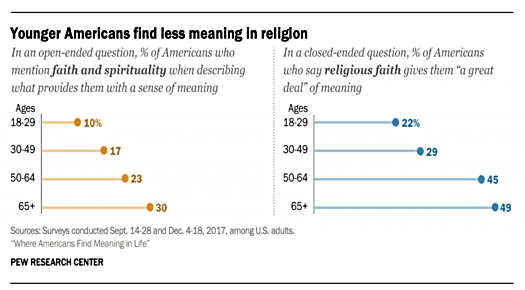
Photo Credit:
A study released by the Pew Research Center tried to find the answer on question ‘Where Americans Find Meaning in Life’ and they found out that religion is becoming less meaningful in their lives. Pew Research Center conducted two separate surveys in late 2017, one with an open-ended question asking Americans to describe in their own words what makes their lives feel meaningful, fulfilling or satisfying and another with a set of closed-ended questions asking Americans to rate how much meaning and fulfillment they draw from each of 15 possible sources identified by the research team.
Family is among the most popular topics across demographic groups; actually 69% of Americans mention their family as a source of meaning and fulfillment. “Career” and “money” were next in line. What about faith? The good news is that only 20% of all people said religion was the most important thing in their lives. The Pew Research Center reports:
Regardless of their religious affiliation, conservative or very conservative Americans are more likely than liberals to mention (in their open-ended responses) their spirituality or faith as a key source of meaning in their lives (33% vs 9%). As one conservative respondent said, “First, my life is rooted in God and the knowledge that He provides unconditional love and support regardless of what is happening in the world. With God at the center of my life, circumstances may change but love, peace, and joy remain.”
For atheists family is important and faith isn’t, but among the other major motivators were hobbies/activities and of course cash. Atheists also found more motivation than people of faith in the areas of creativity (11%), travel (13%), and leisure activities (14%).
Atheists are especially likely to mention hobbies and activities in general — roughly a third (32%) of atheists do so. In particular, they are more likely than Americans overall to mention creative activities like painting and writing, leisure activities like playing games and watching movies, and traveling or exploring new places as sources of meaning and fulfillment in their lives. For example, one said, “I also find a lot of pleasure in trying new things, athletics, and exploration. I have the money and the flexible schedule to go on adventures and challenge myself physically.”

The survey also showed that the younger people are, the less likely religion plays a role in what drives you. It didn’t matter if the question was open-ended or a list of options, only a handful of younger people offered up “religion” as a motivating force. Just 10% of U.S. adults under age 30 mention spirituality, faith or God when describing (in the open-ended question) what affects their sense of meaning. By contrast, three-in-ten adults ages 65 and older mention religion when describing what makes their life meaningful and fulfilling.

